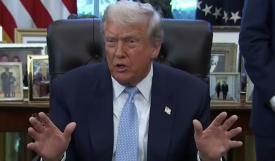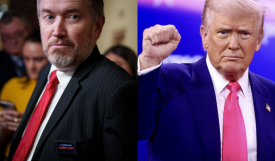TURNOUT: Engaging, Amplifying Latino Voices for Iowa Caucus 2016
Latin Post presents "Turnout," a series featuring leading politicians, government leaders and advocacy groups discussing and debating the most important issues facing the Latino voting bloc.
--
Iowa's Latino population is small, but it's not stopping leaders from engaging the community and amplifying their voices in the state's upcoming caucus.
According to League of United Latin American Citizens (LULAC) of Iowa President Joe Enriquez Henry, the Iowa caucus has always been a bit of an inside game for those who are veterans of politics. He described the caucus as a little bit harder than going to the polls and voting since individuals will have to go to their local precinct location and potentially sit for a couple hours to discuss issues and move around in supporting a candidate. But the Latino voice is being mobilized for the Feb. 1 caucus date.
"The Latino vote in Iowa will be pretty impressive this time around. ... Our plan is to have at least 10 percent of the caucusgoers to be from our [Latino] community. We are reaching out to approximately 15,000 registered Latino voters throughout the state," said Enriquez Henry, who oversees work across 12 Midwest states, including Illinois, Indiana, Kansas, Michigan, Missouri, Ohio, North Dakota, South Dakota and Wisconsin.
For Enriquez Henry, the Midwest is an interesting area that has been saved by immigration, especially in Iowa and Illinois. He told Latin Post immigrants have saved many small communities by creating new small businesses and providing a workforce.
"Their voices will be appreciated on caucus day cause they will have the type of experiences that are needed and the type of knowledge to address the concerns that need to be addressed by the presidential candidates," Enriquez Henry said.
Enriquez Henry is also the president of LULAC's Council 307, which was started in 2011 to provide a political voice to LULAC in Iowa.
"For lack of a better way of saying this, we wanted to put LULAC on steroids. We wanted to become a strong political voice throughout Iowa and also during the legislative session ... and we are building a framework and infrastructure for Latinos to have their voices hear down the road."
In preparing for the Iowa caucus, Enriquez Henry said LULAC of Iowa has focused on 20 counties, which has a majority of Latino registered voters and approximately 700 caucus precincts.
"There are about 1,700 precincts in Iowa, but we wanted to work on the high concentration areas that would give us the most bank for our investment. We can see this happen," said Enriquez Henry, noting the organization will utilize mailings, phone calls, face-to-face interactions and caucus training to engage Latinos.
"This will be the beginning of the Latino vote, and it's going to happen in Iowa. This opportunity has allowed us to amplify our voice. We may only be six percent of the population but we will be at least 10 percent of the caucusgoers and that says a lot and that's going to move the important issues for our community," added Enriquez Henry, identifying the top issues as comprehensive immigration reform, education funding, well-paid jobs and healthcare access.
Enriquez Henry said one candidate Latinos will not be supporting is Republican presidential candidate Donald Trump, based on information he's seen. The LULAC of Iowa director said he believes Latino Republicans will have a very loud voice against Trump and his rhetoric but may still align themselves with other GOP candidates. Enriquez Henry said Latinos are still waiting to hear what Sen. Marco Rubio, R-Fla., has to offer on immigration, while former Florida Gov. Jeb Bush has made it know that his stance includes a pathway to legalization.
The highlight in preparing for the Iowa caucus has been the youth. Enriquez Henry has seen the 18-to-22-year-old demographic step up and become ready to be involved, which include setting demonstrations against Trump, mobilizing up to 800 people, such as in Sioux City a couple months ago, to protest the real estate mogul.
"This is amazing. This shows the political awareness that our young people have gained," said Enriquez Henry, adding that many of these youths are coming from first generation families, and are community colleges or universities and taking on responsibilities. "We hope to see many of them on caucus day, participating in their caucuses and with their parents who've become citizens too to really give us (Latinos) a voice."
__
For the latest updates, follow Latin Post's Politics Editor Michael Oleaga on Twitter: @EditorMikeO or contact via email: m.oleaga@latinpost.com.
Subscribe to Latin Post!
Sign up for our free newsletter for the Latest coverage!
© 2025 Latin Post. All rights reserved. Do not reproduce without permission.














